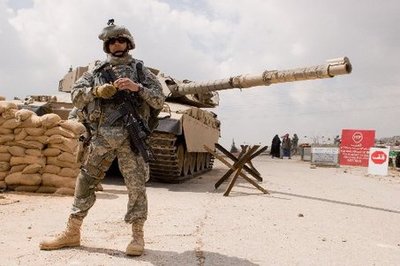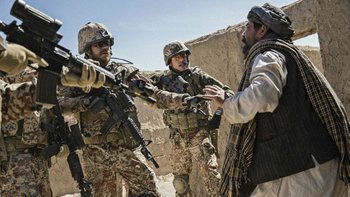
By Elias Savada.
In a world forever at war, Denmark doesn’t float to the top of the list as a country promoting military involvement in remote venues. Interventions have been few and far between since World War II, with its percentage of defense expenditures generally sliding over the last 60 years to just over 1% today. As a comparison, the United States spent about 16% of its budget on its military last year. Bosnia, Iraq, and Libya saw the assistance of the Danish militia as part of broader coalition efforts. Most recently, its contribution to the NATO International Security Assistance Force in Afghanistan is the location examined in Tobias Lindholm’s new film A War (Krigen), a finalist in the current Oscar race for best foreign feature.
So why A War?
“For the past 14 years, Denmark has been a nation at war. It has defined my generation, more than anything else, that we have sent young men to wars that haven’t been about defending Denmark’s borders but are based on a more abstract political choice,” Lindholm says, in the film’s press notes, about picking the war in Afghanistan as his subject. “This film is my stab at processing Denmark’s presence in Iraq and Afghanistan – a process I don’t think has remotely begun. It’s high time that we address what we have sent our men off to in the name of democracy.”
That’s why.
The film begins with the rudimentary excursions by a platoon of soldiers patrolling for land mines in a mountainous region of the battle-scarred country. Magnus Nordenhof Jønck’s camera follows the troops with an embedded-with-troops Steadicam approach, a la Restrepo, the award-winning 2010 documentary. Within minutes, an IED explodes and havoc breaks loose. Another gruesome casualty in a senseless conflict. Homesickness and depression set in among the soldiers. Their commander, 35-year-old Claus Pedersen (Pilot Asbæk) steps into action to steady his men, gathered at their base camp near Lashkar Gah in the Helmand Province.
Back home in Denmark, Pedersen’s flustered wife Maria (Tuva Novotny) has her hands full with her mop-headed son Julius, an unruly and insubordinate child prone to disobedience. Another son ends up in a local emergency room (your gag reflex may set in). It’s a war zone unto itself when dad’s away playing the real one.
Close-ups and hand-held cameras occasionally defer to long shots (binocular- and rifle-scope in concept), capturing the relationships of the men in battle, their reservations of being strangers in a strange land, of endlessly tense patrols in hostile territory, and bungled negotiations with local townsfolk, where the Taliban often shield themselves behind lines of innocence children when not threatening the resident collaborators. Shades of American Sniper (2014) drift about here and there, coloring an otherwise bland landscape.
 Lindholm’s script slips back and forth between the home and away arenas. He did that effectively with his 2012 thriller A Hijacking (Kapringen), moving between a hijacked Danish cargo ship and the company negotiators back in Copenhagen. That film was sadly overlooked when Captain Phillips was released in its wake. Lindholm also co-wrote (with director Thomas Vinterberg) the Oscar-nominated The Hunt (Jagten), a powerful tale of a simple soul crushed by a quick-to-accuse community. The common connection is a central male character caught in society’s crosshairs. A moral dilemma.
Lindholm’s script slips back and forth between the home and away arenas. He did that effectively with his 2012 thriller A Hijacking (Kapringen), moving between a hijacked Danish cargo ship and the company negotiators back in Copenhagen. That film was sadly overlooked when Captain Phillips was released in its wake. Lindholm also co-wrote (with director Thomas Vinterberg) the Oscar-nominated The Hunt (Jagten), a powerful tale of a simple soul crushed by a quick-to-accuse community. The common connection is a central male character caught in society’s crosshairs. A moral dilemma.
In A War, it happens when misguided efforts to rid a local town of the enemy go awry in a very bad way for a local family in a spit of earth called Adam Khan Kalay, and an error in battlefield judgment halfway through the film’s 115-minute running time cause Pedersen’s superiors to question his decisions while under attack. The action abruptly shifts back home for a more casual (but still tense) version of a court martial, and a sooner-than-expected reunification with his concerned family.
Pedersen’s attorney (Søren Malling) suggests his client screw the ethics of the crime and get an acquittal, but Pedersen seems more concerned about telling the truth, no matter how much that hurts his case. Maria, in an anguished scene full of aggression and angst, does not want her man imprisoned and unavailable (again) to their children when they need him most. “We need you at home. The children need you!”
One thing that agitated me was the widespread use of cigarettes in the film, almost to the point that this was a promo piece for the industry, where all puffs seem to offer a calming effect, whether in the dusty Asian war amphitheater or in the comfort of a back yard back home. I’m not sure what that’s all about.
Asbæk, the star of A Hijacking and Lindholm’s feature directorial debut, the prison drama R (2010), also had a good role in Luc Besson’s Lucy (2014). He’s breaking out into more international roles (Pontius Pilate in the new remake of Ben-Hur; Euron Greyjoy in the forthcoming season of Game of Thrones). He does great work with compassionate, tortured characters. Keep an eye on him.
A War is a subtle morality tale where, surprisingly, the spirituality of religion is strikingly missing, so it is not up to the actors to look for sanctuary in a deity of one’s choosing, although during a good part of the film’s second half, composer Sune Rose Wagner and Morten Green’s sound design does sound like a church organ softly playing at a funeral.
The film’s a solid piece of work examining the moral difficulties of war.
Elias Savada is a movie copyright researcher, critic, craft beer geek, and avid genealogist based in Bethesda, Maryland. He helps program the Spooky Movie International Movie Film Festival, and previously reviewed for Film Threat and Nitrate Online. He is an executive producer of the new horror film German Angst and co-author, with David J. Skal, of Dark Carnival: the Secret World of Tod Browning.
